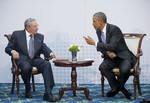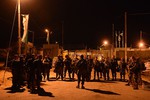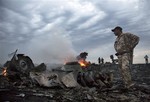- published: 19 Mar 2015
- views: 2264
ATTACK ISIS TERRORIST TUNISIA Islamic State of Iraq and the Levant ISIL or ISIS Islamic State in Iraq and Syria ISIS The EU has blamed Isis for the attack at a museum in Tunisia that left 19 people dead, including 17 foreign tourists. European Union foreign policy chief Federica Mogherini said in a statement: "With the attack that has struck Tunis today, the Daesh terrorist organisation is once again targeting the countries and peoples of the Mediterranean region." "This strengthens our determination to cooperate more closely with our partners to confront the terrorist threat," she said. "The EU is determined to mobilise all the tools it has to fully support Tunisia in the fight against terrorism and reforming the security sector." Tunisia has struggled with violence by armed groups in recent years, including some linked to Isis in Iraq. A researcher at the Quilliam think tank has tweeted a message from a prominent Isil supporter that today's attack is the start of a wave of terrorism in Tunisia. Two days before Wednesday’s attack on a museum connected to the Parliament building in Tunisia, an ominous message was circulated on social media accounts affiliated with the Islamic State group: An attack in Tunisia had been planned and militants were ready to execute. Between two and five gunmen opened fire at Tunisia’s Bardo Museum, killing at least 20 people. The gunmen, and their allegiance, have not been identified, but since Monday social media accounts affiliated with the militant group -- which is also known as ISIS or ISIL -- have been spreading a message claiming an attack in Tunisia was imminent. If true, this is one of ISIS’ biggest attacks, and the first time the militant group pre-emptively announced an attack outside its so-called caliphate in Iraq and Syria. The attack also stands out for its location, a nation with a relatively stable, secular government that, although the source of many ISIS fighters, had never been attacked by the group. “There are two versions of this message. There is one version of this message for the Muslims, that says ‘a message that will rejoice you,'” said Pieter Van Ostaeyen, an independent analyst who focuses on foreign fighters in Syria. “There is another version that would be sent out to the enemies that said ‘a message that will harm you.’” The message did not give any further details about the attack. Earlier this week, a member of Tunisian jihadist group Ansar al-Sharia, affiliated with ISIS, warned Tunisians that attacks were going to take place in the North African country within the coming days. Ansar leader Wannes Fakih reportedly spoke in an audio recording released on YouTube and disseminated over social media Tuesday. One of the gunman had an Ansar flag with him, according to an officer in Tunisia’s National Guard who spoke on the condition of anonymity, because officers are not allowed to speak to reporters. Van Ostaeyen said he received a direct message on Twitter, aimed at ISIS supporters, that said, “Urgent news the state of the caliphate will soon send you a message about the state of Tunisia.” He expected there to be an allegiance announcement, he said. In reality, the message referred to Wednesday’s attack. Isis is a goddess from the polytheistic pantheon of Egypt. She was first worshiped in Ancient Egyptian religion, and later her worship spread throughout the Roman empire and the greater Greco-Roman world. Isis is still widely worshiped by many pagans today in diverse religious contexts; including a number of distinct pagan religions, the modern Goddess movement, and interfaith organizations such as the Fellowship of Isis. Isis was worshipped as the ideal mother and wife as well as the patroness of nature and magic. She was the friend of slaves, sinners, artisans and the downtrodden, but she also listened to the prayers of the wealthy, maidens, aristocrats and rulers.[2] Isis is often depicted as the mother of Horus, the falcon-headed deity associated with king and kingship Isis is also known as protector of the dead and goddess of children. The name Isis means "Throne".[3] Her headdress is a throne. As the personification of the throne, she was an important representation of the pharaoh's power. The pharaoh was depicted as her child, who sat on the throne she provided. Her cult was popular throughout Egypt, but her most important temples were at Behbeit El-Hagar in the Nile delta, and, beginning in the reign with Nectanebo on the island of Philae in Upper Egypt. This myth became very important during the Greco-Roman period. For example it was believed that the Nile River flooded every year because of the tears of sorrow which Isis wept for Osiris. Osiris's death and rebirth was relived each year through rituals. The worship of Isis eventually spread throughout the Greco-Roman world, continuing until the suppression of paganism in the Christian era.[
 Cycling routes save Britain's economy £1m a day The Daily Telegraph
Cycling routes save Britain's economy £1m a day The Daily Telegraph  'Leap second' to pause clocks at midnight as entire planet gains a second The Guardian
'Leap second' to pause clocks at midnight as entire planet gains a second The Guardian  Roger Federer, Andy Murray, Rafael Nadal enter Wimbledon heat The Times of India
Roger Federer, Andy Murray, Rafael Nadal enter Wimbledon heat The Times of India  Lily Allen 'loves LA life' Music News
Lily Allen 'loves LA life' Music News  Eat nuts to keep obesity at bay! Yahoo Daily News
Eat nuts to keep obesity at bay! Yahoo Daily News 


































